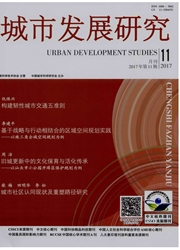

 中文摘要:
中文摘要:
从强调过程以及多元利益主体参与的公共政策视角,分析了20世纪60年代以来西方城市规划理论从渐进主义—倡导式规划—沟通式规划和协作式规划的演进脉络,着重介绍了这些理论产生的社会背景、思想基础、主要特征及对规划实践的贡献。这一演进过程,可以从规划转型的动力机制、社会经济转型后对规划作用的认识、规划师定位的转变、规划教育改革,以及中国城市规划理论的发展等方面,给中国当前的城市规划向公共政策转型带来启示。
 英文摘要:
英文摘要:
The 1960s became a watershed of western urban planning′s evolution which could be summarized as a transformation from an instrument focus mainly on physical space to a public policy which care about more social,economical and political aspects.This paper tries to illustrate the transformation by the new theories occurred since 1960s and their evolution.More details focus on the setting stage,values and goals of these new theories which effect the transformation about the ideal of urban planning,the function of the urban planning and the role of planners,and the development of China′s planning theories.This transformation will give highlight on the need of taking urban planning as public policy in the recent years in China especially on the planning education.
 同期刊论文项目
同期刊论文项目
 同项目期刊论文
同项目期刊论文
 期刊信息
期刊信息
